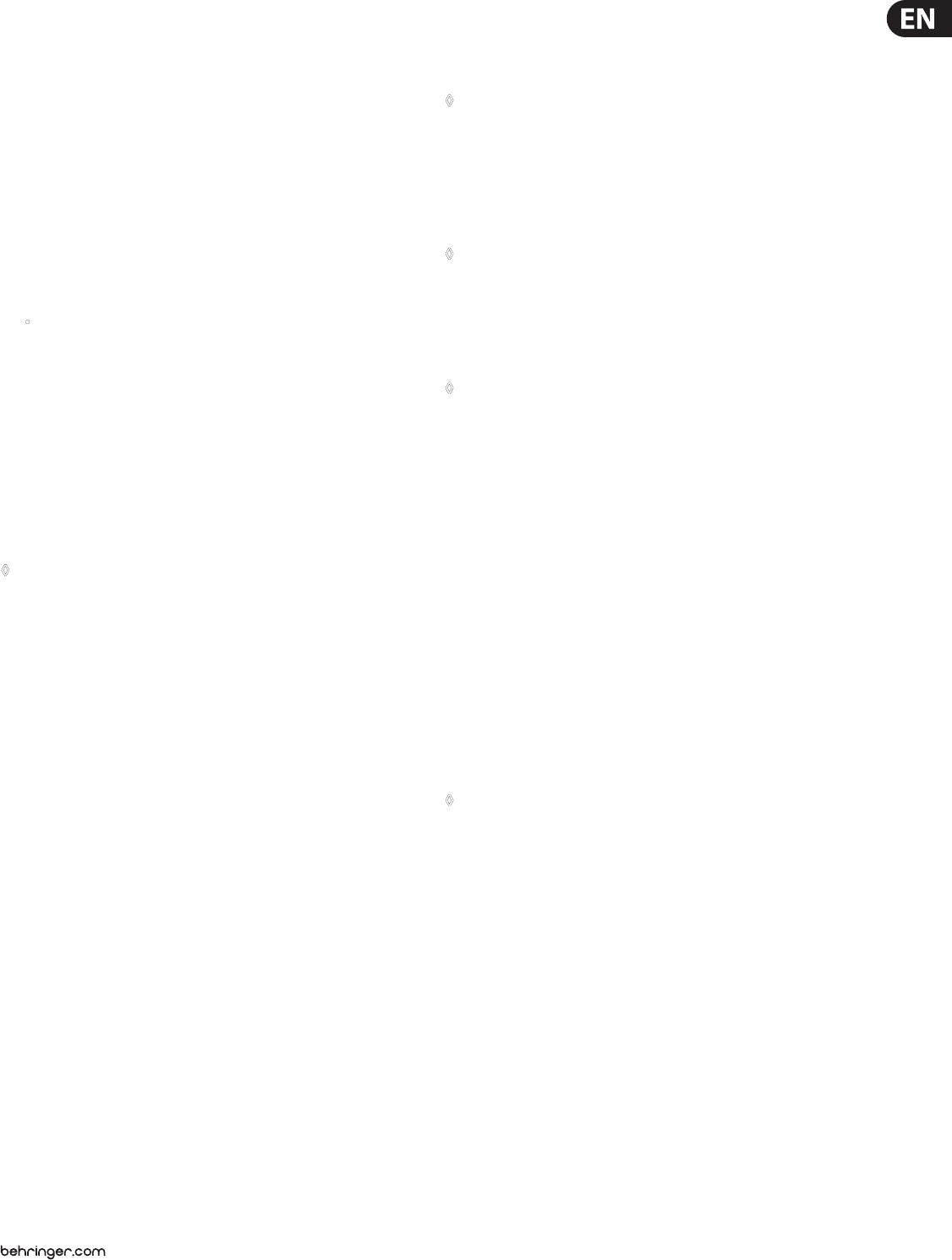
9 FEEDBACK DESTROYER PRO FBQ2496 User Manual
4.2 Setting up parametric lters
Some or even all 40 lters on your FBQ2496 can be deployed as parametric lters.
They have to be set up in a targeted fashion, with great precision. The frequency,
bandwidth and gain parameters are available.
Selecting the number of parametric lters
1. Keep the PEQ button pressed for a few moments. The LED on the PEQ button
blinks, and the display shows the current number of parametric lters (p 0 =
no parametric lters deployed, P20 = all lters are parametric). Additionally,
the LEDs on the deployed Single-Shot lters are lit.
2. You can use the wheel to change the number of parametric lters.
The display shows the number of deployed parametric lters, and the
corresponding LEDs in the status display ((8)) are lit.
3. Pressing the PEQ button again briey completes the procedure.
• Now, the only parametric filters whose LEDs are still lit are those
whose gain (either positive or negative) does not equal zero.
Setting up frequency, bandwidth, gain
You should implement the following procedure with each individual
parametriclter:
1. Briey press the PEQ button.
The LED on the PEQ button is lit. The display indicates the number of the
selected lter (e.g. 19).
2. Use the wheel to select the parametric lter whose values you wish
tomodify.
◊ Any filter may be selected using the wheel! However, the parameters of
the Single-Shot and automatic filters can only be displays and can not
be modified!
3. After you press the FREQUENCY button, use the wheel to set the lter mid
frequency (the LED on the button blinks).
You can get a precise readout of the set mid frequency by observing the
display and the status of the Hz/kHz LED next to it.
To modify exactly the frequency band you have in mind, you can shift the
lter’sbandwidth.
4. Briey press the BANDWIDTH button.
5. Turning the wheel changes the lter’s bandwidth. The 1/60 LED lights up if
a value lower than 0.1 is set (1 x 1/60, 2 x 1/60 ... 5 x 1/60). In case of larger
bandwidths, the value is shown directly in the display (0.1, 0.2 ... 1.0,
1.1 ... 10.0).
A parametric lter becomes engaged only after an increase/decrease of the set
frequency is entered:
6. Briey press the GAIN button. The LED on the button is lit. At the same time,
the dB LED under the 3-digit display is also lit.
7. The gain can be adjusted using the wheel. The available values range from
15 dB to - 36 dB (can be changed in 0.5-dB increments in the +15 dB to
-15dB range; in 1-dB increments in the -16 to -36 dB range). The value is
shown in the display.
◊ The FBQ2496 has a 3-digit display. Positive values are easily represented
(14, 14.5, 15). For negative values, complete representation would
require 4 digits. However, because the display only shows 3 digits,
the position after the decimal point is omitted and replaced by a
dot to the right of the first two digits (-1 5, -1 4 .(5), -1 4, -1 3 .(5)),
which stands for the missing decimal value.
8. Press the PEQ button briey again to complete the procedure.
◊ The status display only shows the filters whose gain does not equal to
zero (either positive or negative).
4.3 Setting up automatic lters
The number of automatic lters can not be separately set. It results from the
number of xed and parametric lters (g. 4.2).
◊ To lower the number of automatic filters, increase the number of
Single-Shot and/or parametric filters.
The automatic lters automatically spring into action on a per-need basis during
a performance or a recording session. Of course, having the FBQ2496 react to
changing situations would be desirable. To allow for this, you need to establish
a setup in which the automatic lters are only periodically active, setting
themselves back to zero afterwards in order to be ready for the next instance in
which feedback is occurring.
The so-called “Filter Lifting Time” informs you about how long a lter set to
automatic may remain active before its values are reset back to zero. This Filter
Lifting Time can be set on the FBQ2496.
1. Press the FILTER LIFT button. The LED on the button starts to blink.
2. Using the wheel, Filter Lifting Time can either be turned o (off) or can be
set to 1 min, 5 min, 10 min, 30 min or 60 min.
3. To exit this menu, press the FILTER LIFT button again. The LED no
longerblinks.
4. If a Filter Lifting Time value has been set (i.e. any value other than off!),
the button LED is lit.
◊ If a satisfactory setting for the Single-Shot and automatic filters
has been achieved, you can keep this setting by pressing the FREEZE
button. The display shows: -.


















